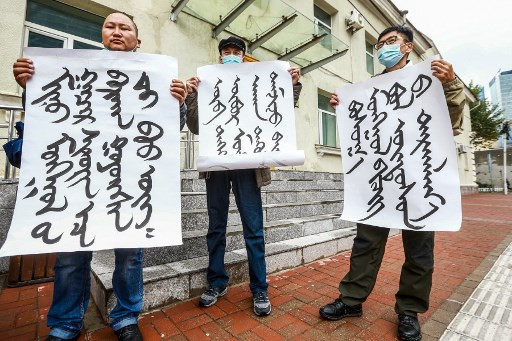Popular Reads
Top Results
Can't find what you're looking for?
View all search resultsPopular Reads
Top Results
Can't find what you're looking for?
View all search resultsEthnic Mongolians in China protest removal of traditional language in schools
Change text size
Gift Premium Articles
to Anyone
 Mongolians protest at the Ministry of Foreign Affairs in Ulaanbaatar, the capital of Mongolia, against China's plan to introduce Mandarin-only classes at schools in the neighbouring Chinese province of Inner Mongolia on August 31, 2020. - China announced from September 1 that three key subjects taught in primary and middle schools in their province of Inner Mongolia will be taught in Mandarin instead of Mongolian, with Mandarin-language lessons to be introduced at a younger age. The announcement led to widespread opposition among parents, teachers and ordinary citizens in Inner Mongolia, fearing it will lead to a generation of children losing their mother tongue. (AFP/Byambasuren Byamba-Ochir )
Mongolians protest at the Ministry of Foreign Affairs in Ulaanbaatar, the capital of Mongolia, against China's plan to introduce Mandarin-only classes at schools in the neighbouring Chinese province of Inner Mongolia on August 31, 2020. - China announced from September 1 that three key subjects taught in primary and middle schools in their province of Inner Mongolia will be taught in Mandarin instead of Mongolian, with Mandarin-language lessons to be introduced at a younger age. The announcement led to widespread opposition among parents, teachers and ordinary citizens in Inner Mongolia, fearing it will lead to a generation of children losing their mother tongue. (AFP/Byambasuren Byamba-Ochir )
E
thnic Mongolians in China's north have staged rare protests over changes to school curriculums that remove Mongolian language from core subjects, a show of defiance that has led to curfews in some areas, according to an advocacy group.
New guidelines in the Chinese-administered Inner Mongolia region require elementary and secondary school subjects including history, politics and language to be taught in Mandarin beginning on September 1.
Videos circulated by New York-based advocacy group, the Southern Mongolian Human Rights Information Center, show angry crowds of students and parents gathering outside schools to protest the move.
The group said protesters number in the thousands. Reuters could not independently verify the figures.
Director Enghebatu Togochog told Reuters they believe the program is part of a wider push by Beijing to wipe out Mongolian culture in the region, and said some parents pulled their children from the schools in protest.
The standardization of national education is a key policy drive under China's President Xi Jinping, largely focusing on promoting loyalty to China and the Communist Party.
In a Q&A posted online, Inner Mongolian regional education authorities defended the changes, saying they "reflect the will of the Party and nation ... and the inherent excellence of Chinese culture and advances to human civilization".
China's Education Ministry and Ethnic Affairs Commission did not immediately respond to requests for comment on Wednesday.
Videos of the protests appeared on Chinese social media site Weibo on Monday, but have since been removed, according to Reuters checks.
The advocacy group also said videos show curfews were put in place starting on Monday in Lubei town, in the region's east.
Traffic authorities in Fengzhen, a city southeast of regional capital Hohhot, released a notice on Monday that said they developed a plan for "emergencies involving ethnic languages" to "maintain the city's political and social stability."
Local civil unrest is unusual in China, where the internet is tightly controlled and police crack down on gatherings quickly.
Preserve the mother tongue
The changes have sparked protest in the independent nation of Mongolia, which shares a border with the Chinese-administered Inner Mongolia.
"We need to voice our support for Mongolians striving to preserve their mother tongue and scripture in China. The right to learn and use one's mother tongue is an inalienable right for all," tweeted former Mongolian president Tsakhia Elbegdorj on Tuesday.
In Mongolia's capital, Ulaanbaatar, a small number of people gathered at the Chinese embassy on Monday to protest the changes.
"Most of us have lost the ability to speak proper Mongolian, but Inner Mongolians have kept that tradition intact. I am here to show solidarity with my southern brethren," philosophy teacher Tseren Tuvshinjargal told Reuters.
The program to replace ethnic languages in core courses has been deployed in Xinjiang and Tibet beginning in 2017, areas known for unrest between authorities and ethnic minorities.
"Mastering the national spoken and written language is the responsibility and obligation of every Chinese citizen. It is a concrete manifestation of love for the party and country," said state media outlet Inner Mongolia Daily on Tuesday.









